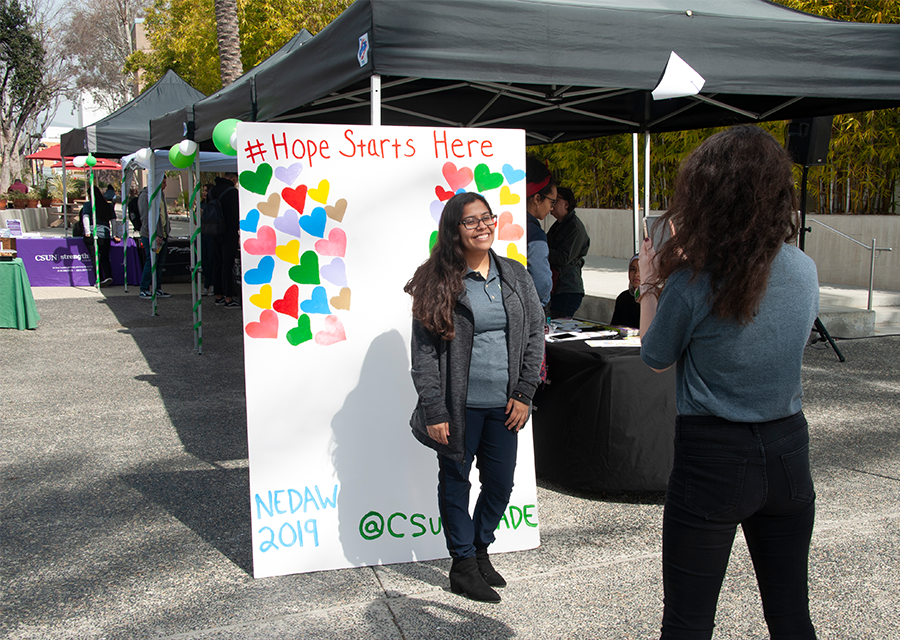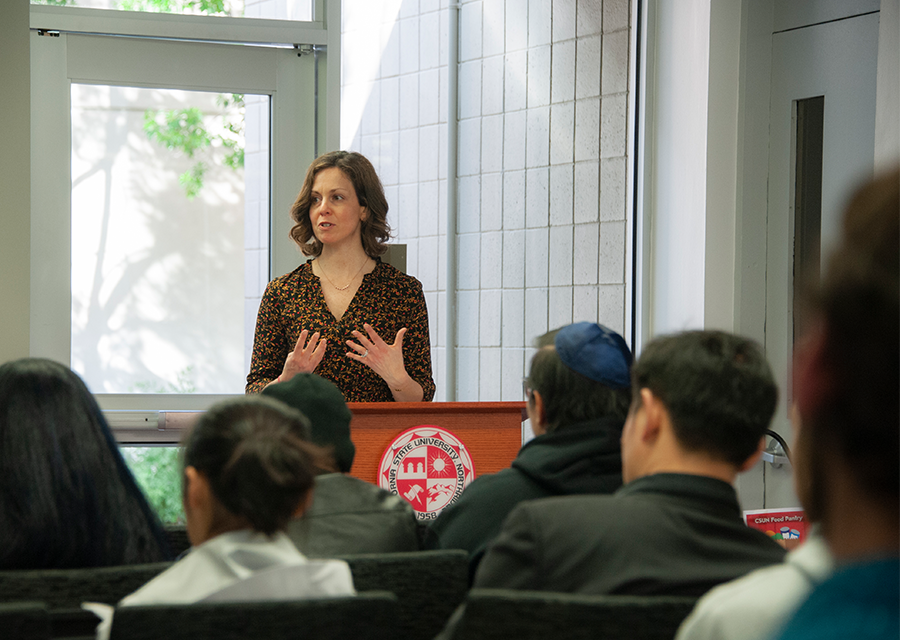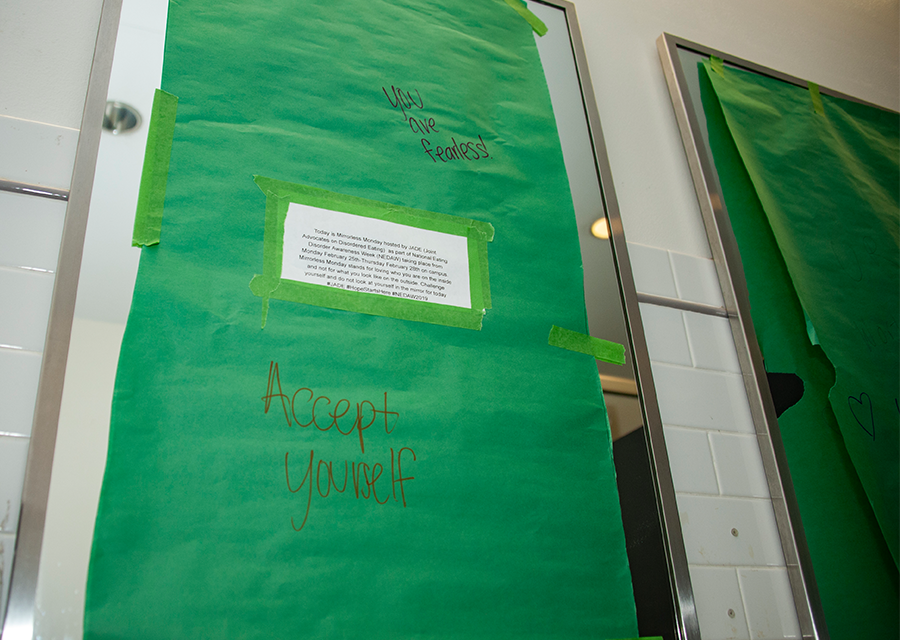National Eating Disorders Awareness Week Reminds CSUN Community About the Importance of Positive Self-Talk
“It was an innocent intention, but that seed that he planted sprouted into a nasty eating disorder,” said Jennifer Kreatsoulas, recalling how simple words from her rowing coach at a Pennsylvania college changed the way she looked at herself and her body into something destructive.
Kreatsoulas’ experience, unfortunately, is more common than we may realize, and it is a reality even on our campus.
In an effort to raise awareness, the Joint Advocates on Disordered Eating (JADE) of California State University, Northridge hosts a series of events every year during National Eating Disorders Awareness Week in late February, to address the issues surrounding eating disorders and to promote body positivity among the CSUN community.
“It is important that we acknowledge how students are being impacted on campus,” said Cindy Lucio, coordinator of JADE.
This year’s program, which took place Feb. 25-28, included the “Hope Grows Here” resource fair at the Plaza del Sol, “Yoga on the Lawn” on the Bayramian Lawn, and “Mirrorless Monday.” The campus-wide “mirrorless” project, where mirrors across campus were covered with paper bearing positive messages — such as “You are unique” or “Appreciate yourself” — served as a healthy reminder for students, faculty and staff alike to focus on inner beauty. The program also featured talks and panels led by a variety of guest speakers covering topics such as self-worth, having an optimistic mindset, substance addiction, mindful eating, eating disorders across ethnicities, and eating disorders within the LGBTQ community.
Only 25 percent of respondents in a survey of 12,000 men and women in the United States were satisfied with their own appearance, according to psychologist Margo Maine in a report to the National Eating Disorder Information Centre’s Body Image and Self-Esteem Conference in 2017.
“We’re in a body image crisis,” said Kreatsoulas, founder of Yoga for Eating Disorders and author of the book “Body Mindful Yoga,” in her keynote presentation on Feb. 26 at CSUN’s University Student Union.
In the presentation titled “Embodying Hope: A Keynote and Discussion on Body Image, Narrative and Personal Empowerment,” Kreatsoulas focused on how social messages (stories, ideas and beliefs perpetuated by society and the media) and self-talk (how we speak to ourselves in our minds) shape how we perceive our own body image, and how this language can be used for empowerment instead of self-criticism.
In the national-level celebration led by the National Eating Disorders Association, the theme of this year’s awareness week was “Come as you are.” At CSUN, the slogan was “Hope starts here.” Kreatsoulas combined these two mottos for her talk, aiming to encourage the CSUN community to find “a connection with [their] most hopeful, empowered and authentic selves.”
Finding that authentic self is no easy feat, especially when social messages exert immense pressure to achieve an ideal physical appearance — messages in food culture, social media, and the fitness and fashion industries that tell consumers to aim for a perfect “beach body” or try out a specific diet. These can perpetuate insidious messages behind seemingly harmless mantras such as “strong is the new skinny” and “new year, new you,” Kreatsoulas said.
The potency of words in creating a negative self-perception was something she discovered during her sophomore year in college in Pennsylvania, when she was an athlete and rowed crew.
“I never really thought about my body. I was just doing what I loved,” she said. “Then, one time, my coach said, ‘I can tell how hard you’re working by how your body looks.’ I translated that as, ‘I need to get smaller.’ Now, I had to prove myself through my body. Now, the stakes were higher.”
Deciding that her appearance was equivalent to her success, Kreatsoulas began to skip meals and work out more intensely to lose weight. A year later, she was hospitalized for anorexia.
Though equally culpable, these words from society are not the only force behind negative self-perception, Kreatsoulas said.
The main suspect? It’s destructive self-talk. Kreatsoulas said this internal dialogue is what she calls a “body narrative.”
“Body narratives are memories, words and emotions you have in your mind or say out loud to others about your body,” she said. “But the great thing about language is, we all hold it differently. We can make our body narrative work for us.”
Perhaps we have to plant healthier seeds in our minds, then, using words that give us hope. While in treatment for anorexia, a body image group therapy session offered Kreatsoulas holistic and encouraging messages to dwell on.
“Body image is not a fact,” Kreatsoulas said, echoing her therapist’s words. “If it’s not a fact, and it’s something else, then there’s hope. And if there’s a possibility of hope, let’s go after it.”
The key is body-mindful language, Kreatsoulas said. Changing deprecatory self-talk into body positivity can lead to a new, healthier self-perception.
Kreatsoulas said it can be as simple as taking those popular media slogans, which have the potential to trigger negative self-perceptions, and rewriting them in our minds to bring out more encouraging thoughts. The session culminated in discussions about these slogans and their possible rewrite, and one audience member offered turning “new year, new me” into “new year, more compassionate me,” shifting the focus from external beauty to internal beauty.
Using the psychological concept of neuroplasticity — the brain’s ability to create new neural pathways — Kreatsoulas encouraged repeating constructive self-talk every day until the idea fully settles in our minds.
“Changing the way we feel about ourselves — it’s a commitment,” Kreatsoulas said.
Kreatsoulas also challenged attendees to try a simple body exercise: Come up with a personal four-word mantra — such as, “Peace begins with me” — and touch the tip of their thumb to each of their four fingers while uttering each word in their mind. This technique, Kreatsoulas said, is an easy way to plug optimistic self-talk into daily practice.
“Find your own words. What’s a vibe you want to get, or a value you want to cultivate?” Kreatsoulas said. By planting hopeful words in the soil of our minds, we can begin to find our authentic selves. “I’m going to use my body so I can come as I am,” she said.
Operating under University Counseling Services, JADE is a peer-education program dedicated to increasing awareness about and preventing eating disorders. To learn more about JADE and its resources, visit https://www.csun.edu/counseling/jade.






 experience
experience